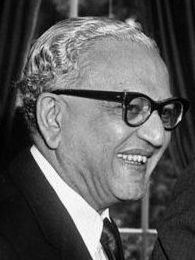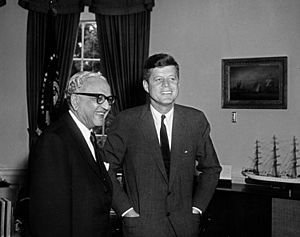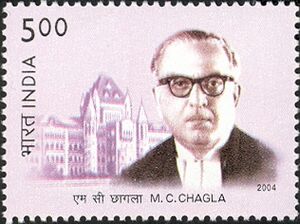M. C. Chagla facts for kids
Quick facts for kids
Mohammadali Carim Chagla
|
|
|---|---|

Chagla in 1961
|
|
| 5th Minister of External Affairs | |
| In office 14 November 1966 – 5 September 1967 |
|
| Prime Minister | Indira Gandhi |
| Preceded by | Swaran Singh |
| Succeeded by | Indira Gandhi |
| 4th Minister of Education | |
| In office 21 November 1963 – 13 November 1966 |
|
| Prime Minister | Jawaharlal Nehru Gulzarilal Nanda (Acting) Lal Bahadur Shastri Indira Gandhi |
| Preceded by | Humayun Kabir |
| Succeeded by | Fakhruddin Ali Ahmed |
| 4th High Commissioner of India to the United Kingdom | |
| In office April 1962 – September 1963 |
|
| Prime Minister | Jawaharlal Nehru |
| Preceded by | Vijaya Lakshmi Pandit |
| Succeeded by | Jivraj Narayan Mehta |
| 6th Ambassador of India to the United States | |
| In office 1958–1961 |
|
| Prime Minister | Jawaharlal Nehru |
| Preceded by | Gaganvihari Lallubhai Mehta |
| Succeeded by | B. K. Nehru |
| Chief Justice of Bombay High Court | |
| In office 1947 - 1958 |
|
| Succeeded by | Hashmatrai Khubchand Chainani |
| Personal details | |
| Born | 30 September 1900 Bombay, Bombay Presidency, British India |
| Died | 9 February 1981 (aged 80) |
| Political party | Indian National Congress |
| Alma mater | Lincoln College, Oxford |

Mohammadali Carim Chagla (born September 30, 1900 – died February 9, 1981) was an important person in India's history. He was a skilled judge, a diplomat who represented India in other countries, and a Cabinet Minister in the Indian government. He served as the top judge (Chief Justice) of the Bombay High Court from 1947 to 1958.
Contents
Early Life and Education
Mohammadali Carim Chagla was born on September 30, 1900, in Bombay (now Mumbai). He came from a well-off family. Sadly, his mother passed away in 1905, which made his childhood a bit lonely.
He went to St. Xavier's High School and College in Bombay. After that, he traveled to England to study Modern History at Lincoln College, Oxford, from 1918 to 1921. In 1922, he became a lawyer at the Bombay High Court. There, he worked alongside famous lawyers like Sir Jamshedji Kanga and Mohammed Ali Jinnah, who later founded Pakistan.
A Career in Law and Public Service
Chagla became a Professor of law at the Government Law College, Bombay in 1927. He worked with Dr. B.R. Ambedkar, another very important figure in Indian history. In 1941, Chagla was appointed a judge to the Bombay High Court. He became the Chief Justice in 1948 and held that position until 1958. During this time, he strongly supported India's fight for freedom and unity.
In 1946, Chagla was part of the first Indian group to attend the United Nations (UN). From October 4 to December 10, 1956, he served as the temporary Governor of the state of Bombay. After his time as Chief Justice, he led a special investigation into a financial matter involving the Finance Minister, T. T. Krishnamachari. Chagla's findings led to Krishnamachari's resignation. From 1957 to 1959, Chagla also served as a temporary judge at the International Court of Justice in The Hague.
Diplomat and Cabinet Minister
After retiring from his judge role, Chagla became India's ambassador to the United States from 1958 to 1961. An ambassador represents their country in another nation. He then served as India's High Commissioner (a similar role for Commonwealth countries) in the United Kingdom from 1962 to 1963.
When he returned to India, he was asked to join the government as a Cabinet Minister. He accepted and served as the Education Minister from 1963 to 1966. After that, he became the Minister for External Affairs (Foreign Minister) from November 1966 to September 1967. After this, he left government service but continued to practice law for many more years.
As Education Minister under Prime Minister Jawaharlal Nehru, Chagla was concerned about the quality of education in government schools. He believed that children deserved proper schools with trained teachers and good facilities, not just basic buildings.
Family Life
In 1930, Chagla married Mehrunissa Dharsi Jivraj. They had a happy marriage and four children: two sons, Jehangir and Iqbal, and two daughters, Husnara and Nuru. His son Iqbal Chagla also became a lawyer. Iqbal's son, Riaz, followed in his grandfather's footsteps and was appointed a judge of the Bombay High Court in 2017.
Chagla's younger daughter, Nuru, married Subbaram Swaminathan. He was from a different background, showing how families can connect across different traditions.
Mehrunissa Dharsi Jivraj passed away in 1961. Chagla lived for another nineteen years after her, passing away in 1981.
Later Years and Legacy
In 1973, Chagla wrote his autobiography, a book about his own life, called Roses in December. He strongly spoke out against a period in India called The Indian Emergency (1975-1977), when civil liberties were restricted.
Mohammadali Carim Chagla passed away on February 9, 1981, at the age of 80 due to heart failure. He had been unwell for several years but remained active. On the day he died, he enjoyed time with friends at his club in Bombay. He then peacefully passed away in the dressing room. As he wished, he was cremated. The Bombay High Court was closed to honor him, and many people, including former Prime Minister Atal Bihari Vajpayee, gave speeches remembering him.
In 1985, a statue of Chagla was placed inside the Bombay High Court, near the Chief Justice's Court where he once worked. The words on the statue say: "A great judge, a great citizen, and, above all, a great human being."
Interesting Facts
- Although he was born into a Muslim family, Chagla was not strictly religious in his personal beliefs.
- His last name, "Chagla," was not his family's original surname. In his autobiography, he explained that his family was known as "Merchant" because his father and grandfather were merchants. He disliked this name because it reminded him of money. One day, he asked his grandfather what he should call himself. His grandfather suggested "Chagla," which was his great-grandfather's nickname. In the Kutchi language, "Chagla" means "favourite." Mohammadali quickly adopted this new surname.
 | Leon Lynch |
 | Milton P. Webster |
 | Ferdinand Smith |


